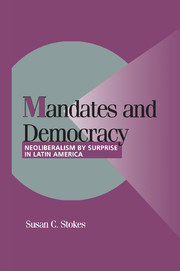Book contents
- Frontmatter
- Contents
- Preface
- 1 ELECTIONS, MANDATES, AND REPRESENTATION
- 2 ELECTIONS AND ECONOMIC POLICY IN LATIN AMERICA
- 3 EXPLAINING POLICY SWITCHES
- 4 ARE PARTIES WHAT'S WRONG WITH DEMOCRACY IN LATIN AMERICA?
- 5 NEOLIBERALISM WITHOUT MANDATES: CITIZENS RESPOND
- 6 MANDATES AND DEMOCRATIC THEORY
- 7 SUMMARY, PREDICTIONS, UNSETTLED QUESTIONS
- References
- Author Index
- Subject Index
- Titles in the series
1 - ELECTIONS, MANDATES, AND REPRESENTATION
Published online by Cambridge University Press: 10 December 2009
- Frontmatter
- Contents
- Preface
- 1 ELECTIONS, MANDATES, AND REPRESENTATION
- 2 ELECTIONS AND ECONOMIC POLICY IN LATIN AMERICA
- 3 EXPLAINING POLICY SWITCHES
- 4 ARE PARTIES WHAT'S WRONG WITH DEMOCRACY IN LATIN AMERICA?
- 5 NEOLIBERALISM WITHOUT MANDATES: CITIZENS RESPOND
- 6 MANDATES AND DEMOCRATIC THEORY
- 7 SUMMARY, PREDICTIONS, UNSETTLED QUESTIONS
- References
- Author Index
- Subject Index
- Titles in the series
Summary
Neoliberalism by Surprise
Latin American governments undertook a revolutionary reorientation of their economies in the final decades of the twentieth century, from statist to market-oriented models. They demolished tariff barriers, privatized hundreds of state-owned enterprises, deregulated product, capital, and labor markets, and slashed state employment. What distinguished these from earlier drives toward economic liberalization is that they were carried out by governments that had to win elections before coming to office and knew they would face new elections at the end of their term.
The marriage of economic liberalization and democracy, first considered doomed, has endured. It has not always been smooth. Not all governments promoting liberalization have survived to the next election. Venezuela's Carlos Andrés Pérez (1989–1993) was shaken by two coup attempts by military officers angry about reforms and was later impeached on corruption charges. Austerity measures under President Abdalá Bucaram (1996) in Ecuador set off street protests and were the backdrop to his impeachment less than seven months after he assumed office. Liberalization and its aftermath set off riots and strikes from the Dominican Republic to Argentina. Yet on the whole, what stands out is the endurance of democratic governments. During these revolutionary decades, only two coups d'etat brought down elected governments.
It would be a mistake, however, to infer that the elected governments that liberalized their economies were simply enacting the people's will. The timing, priorities, magnitude, content, style, and sequencing of economic reform programs are controversial, their distributional impact is potentially powerful, and their public support is mixed.
- Type
- Chapter
- Information
- Mandates and DemocracyNeoliberalism by Surprise in Latin America, pp. 1 - 24Publisher: Cambridge University PressPrint publication year: 2001

